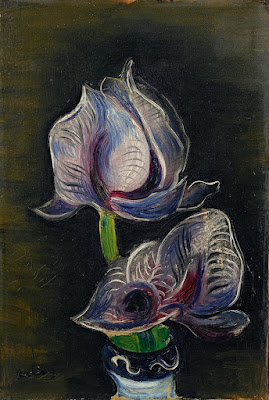 |
| Fritz Syberg Mullein Blossoms 1898 oil on canvas Ordrupgaard Art Museum, Copenhagen |
 |
| John La Farge Roses on a Tray 1861 oil on Japanese lacquer panel Carnegie Museum of Art, Pittsburgh |
 |
| Jacob Marrel Still Life with Flowers ca. 1650 oil on panel Hamburger Kunsthalle |
 |
| Robert Caumont Cascade of Roses 1914 drawing Musée des Beaux-Arts de Bordeaux |
 |
| Camille Pissarro Blossoming Plum Trees, Éragny 1894 oil on canvas Ordrupgaard Art Museum, Copenhagen |
 |
| Emil Nolde Red and Yellow Roses 1907 oil on canvas Museum Ludwig, Cologne |
 |
| Henri Le Sidaner Rose Garden at Twilight 1923 oil on canvas John and Mable Ringling Museum of Art, Sarasota |
 |
| Isaak Soreau Still Life with Tulips, Strawberries, Grapes and Cherries ca. 1625 oil on copper National Gallery, Athens |
 |
| Theodor Aman Still Life with Roses ca. 1860-70 oil on canvas Romanian National Museum of Art, Bucharest |
 |
| Emil Nolde Tulips 1915 oil on canvas Museum Ludwig, Cologne |
 |
| Barbara Regina Dietzsch Tulip with Butterfly and Cockchafer ca. 1750 gouache on paper Hamburger Kunsthalle |
 |
| John La Farge Camellias in a Japanese Pot 1879 watercolor on paper Rhode Island School of Design, Providence |
 |
| Emil Rudolf Weiss Still Life with Roses 1906 oil on canvas Museum Ludwig, Cologne |
 |
| Moïse Kisling Irises 1936-37 oil on canvas Museum Ludwig, Cologne |
 |
| Max Ernst Flowers on Yellow Ground 1929 oil on canvas Graphische Sammlung Albertina, Vienna |
-2008-screenprint-(poster)-Museum-Folkwang-Essen.jpg) |
| Stephan Bundi Weisse Rose (opera by Udo Zimmermann) 2008 screenprint (poster) Museum Folkwang, Essen |
from Little Lesson on How to Be
The woman at the Salvation Army who sorts and prices is in her eighties
and she underestimates the value of everything, for which I am grateful.
Lightly used snow suits, size 2T, are $6 and snow boots are $3.
There is a little girl, maybe seven, fiddling with a tea set. Her mother
and she underestimates the value of everything, for which I am grateful.
Lightly used snow suits, size 2T, are $6 and snow boots are $3.
There is a little girl, maybe seven, fiddling with a tea set. Her mother
inspects drapes for stains.
Sometimes the very old and lonely are looking for an opening.
She glances up from her pricing and says something about the tea set
and a baby doll long ago.
I am careful not to make eye contact, but the mother with drapes has
Sometimes the very old and lonely are looking for an opening.
She glances up from her pricing and says something about the tea set
and a baby doll long ago.
I am careful not to make eye contact, but the mother with drapes has
such softness in her shoulders and her face and she knows how to say
the perfect kind thing – "What a wonderful mother you had."
"Yes, she was."
the perfect kind thing – "What a wonderful mother you had."
"Yes, she was."
Why do children sometimes notice us and sometimes not?
From the bin of dolls: "What happened to your mother?"
– Kathryn Nuemberger (2011)